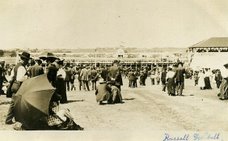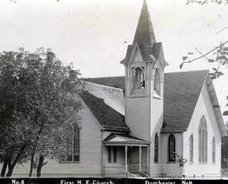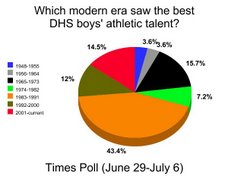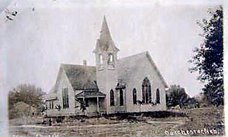 Pleasant Hill -- Dorchester's sister community -- is still making headlines, years after its supposed demise.
Pleasant Hill -- Dorchester's sister community -- is still making headlines, years after its supposed demise.Over the past month, The Crete News has published a four-part series recalling the history of Pleasant Hill. The last story of the series can be found by clicking here.
In the Jan. 23 issue of The Crete News, the paper recounts the late chapters of the little community in the middle of Saline County and the "two businesses (that) kept Pleasant Hill barely on the map and in the minds of area residents — a tavern with a small store and the garage Bill Mariska started in 1923."
The Pleasant Hill Store (remembered by most for its cold beer, good food and fine polka) saw a laundry list of owners in its final three dacades -- the Jiskras; the Kubes'; Louis Ladman; the Breitkreutzs; Stub Weber; and John and Vel Busboom, "who couldn’t keep the doors open anymore. They still live there." When the last beer was served at the Pleasant Hill Store in 1996, it brought an end to the longest running business in Pleasant Hill -- after nearly 130 years.

According to The Crete News article, "The tavern was the center of activity for the rural area during a time when the residents in the original town numbered less than forty. Theresa Vernon, daughter of Alfred and Libbye Jiskra, remembered many activities at the tavern and store when her parents ran it.
Outdoor movies were a favorite, with kids sitting on wooden benches watching “Ma and Pa Kettle” or the often popular westerns. Bingo nights and coon feeds accompanied duck dinners and live music on Sundays when certainly one or two accordion players could be found. People came down from Lincoln on Sundays in search of a drink. 'We were packed on Sundays,' Vernon remembers."
Another key Pleasant Hill business, the garage, was started by Bill Mariska in 1923. It stood just south of the old schoolhouse facing Franklin street. The Mariska's "sold used cars, were the first to sell tractor tires in the area, and had working gas pumps from 1923 to 1976. The shop also sold radios, refrigerators and some of the first gas powered mowers starting in 1950. ... Bill’s son, Bob Mariska, now 88, remembers they had the largest stock of Case parts for a hundred miles. Customers from Grand Island and Kearney were frequent, and one flew in, landing his small plane in a field not far from the garage.
"Bob Mariska now lives in the house his father built next to the garage in 1929, the house he grew up in. 'I have been here a long time and I have a pretty good memory. I’m proud of that,' Mariska said. He remembers watching with his classmates as the mill burned in 1930, the streets being vacated, those frustrated over the increase in their taxes when the land was officially made theirs. 'They were farming that land for free before it was vacated,' he said. Some of the houses in the dying town burned. For a period of time between 1924 and 1932, blocks of the town were bought up and the empty houses were moved.
There have only been three homes built in Pleasant Hill in the last 80 years, according to Bob Mariska. The first was his father’s 1929 family home; the second was his own first home next door; and the last was a brick house built in 1980 in what was once the north section of town. Mariska thinks the town died around 1900. Transportation was poor, no railroad came through, and the county seat had been lost.
The article also references Warren and Jo Cerny, who have lived on the east edge of Pleasant Hill for 50 years. “The community doesn’t get together anymore,” Jo Cerny said.
Mariska knows Pleasant Hill will never be incorporated — it never was to begin with. But it is still a location, people still see the signs, remember what was.
Darlene Kubes, whose grandfather was Joe Kubert -- owner of the saloon in the old courthouse -- lives in the house that was once his. She is the fifth generation of her family to inhabit the homestead. Even after a tornado last spring questioned her desire to live out in Pleasant Hill, she stayed. She wouldn’t live anywhere else, she said.
The article concludes: Mariska and Kubes, who both spoke Czech when they entered school, and the Cernys, who cling to their Atlas that shows the plotted map of a town that could have been, are among the last to hold the living history of Pleasant Hill. The faded signs still stand to the north and south of town on County Road 1600. The signs on highways 33, 15 and 41 were taken down by the Department of Roads several times but put back up in 1997 after a petition garnered 129 signatures. Residents and those with connections to the area don’t want to lose one of the last physical remnants of Pleasant Hill.
Scrapbooks tell the tales of Pleasant Hill. But the richest memories lie with the people.


















































WOW, what memories. I grew up on a farm near Pleasant Hill and remember those outdoor movies--that was a huge thing for us kids. Dad bought me orange pop at the tavern and Mom bought bologna/lunch meat at the store. I took tap dance lessons from Theresa. Loved going down there to "eat out". Many good times and great memories.
ReplyDeleteI wish I could go back in time and see P. Hill in its prime. It must have been quite something if it had more than 500 residents in the mid 1880s!
ReplyDeleteJust for the record it was Stub Weber not Hub Weber. I know because he is my grandpa
ReplyDelete